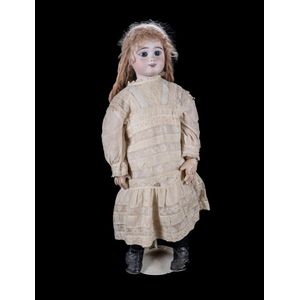Antique French Bisque Doll, Paris 9 Mark, 1900
Eden Bebe French bisque doll. circa 1900, socket head on composition fully jointed body, fully dressed in vintage white silk and lace dress, period button boots. Doll has Paris 9 mark on back of head, open mouth with exposed teeth, wide blue eyes, reddish blond plaited wig. Hands are complete, showing cracking and wear. Height 56 cm
You must be a subscriber, and be logged in to view price and dealer details.
Subscribe Now to view actual auction price for this item
When you subscribe, you have the option of setting the currency in which to display prices to $Au, $US, $NZ or Stg.
This item has been sold, and the description, image and price are for reference purposes only.
- Circa - A Latin term meaning 'about', often used in the antique trade to give an approximate date for the piece, usually considered to be five years on either side of the circa year. Thus, circa 1900 means the piece was made about 1900, probably between 1895 and 1905. The expression is sometimes abbreviated to c.1900.
- Composition - Composition is a material used for dolls, sculpture and furniture. It is a type of composite material made from a mixture of materials such as sawdust, glue, and pigments. It is a popular material for dolls and figurines because it is lightweight and easy to work with. It is also used in furniture-making, particularly in the construction of decorative pieces such as figurines and sculptures. It is less common in high-end furniture as it is not as durable as some other materials such as wood or metal. However, it is a more affordable and accessible option for some types of decorative pieces.
- Open Mouth Doll - An "open mouth" doll is a doll with a mouth that is designed to be open showing moulded or inserted teeth, as if the doll is in the process of speaking or singing. This type of doll was first introduced in the late 19th century and became increasingly popular in the early 20th century. Open mouth dolls were typically made of bisque, a type of unglazed porcelain that is fired at a lower temperature than traditional porcelain. The open mouth design allowed doll manufacturers to create dolls with a more expressive, lifelike appearance, as the open mouth made it possible to add teeth, a tongue, and other features that added to the doll's realism. Open mouth dolls were often dressed in elaborate costumes and accessories, and were marketed to both children and adults as decorative objects.
This item has been included into following indexes:
